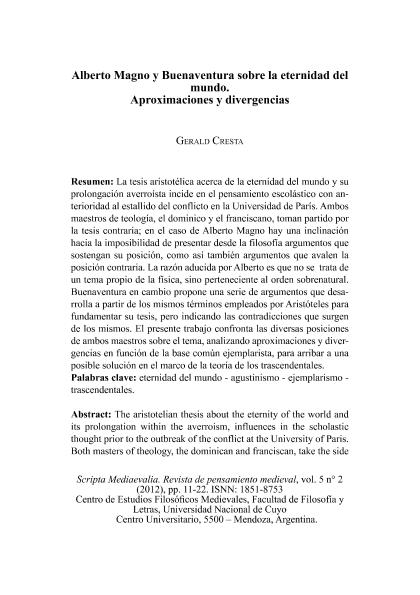Mostrar el registro sencillo del ítem
dc.contributor.author
Cresta, Norberto Gerald

dc.date.available
2023-05-18T13:57:48Z
dc.date.issued
2012-11
dc.identifier.citation
Cresta, Norberto Gerald; Alberto Magno y Buenaventura sobre la eternidad del mundo: aproximaciones y diferencias; Universidad Nacional de Cuyo. Facultad de Filosofía y Letras. Centro de Estudios Filosóficos Medievales; Scripta Mediaevalia; 5; 2; 11-2012; 11-22
dc.identifier.issn
1851-8753
dc.identifier.uri
http://hdl.handle.net/11336/198023
dc.description.abstract
La tesis aristotélica acerca de la eternidad del mundo y su prolongación averroísta incide en el pensamiento escolástico con anterioridad al estallido del conflicto en la Universidad de París. Ambos maestros de teología, el dominico y el franciscano, toman partido por la tesis contraria; en el caso de Alberto Magno hay una inclinación hacia la imposibilidad de presentar desde la filosofía argumentos que sostengan su posición, como así también argumentos que avalen la posición contraria. La razón aducida por Alberto es que no se trata de un tema propio de la física, sino perteneciente al orden sobrenatural. Buenaventura en cambio propone una serie de argumentos que desarrolla a partir de los mismos términos empleados por Aristóteles para fundamentar su tesis, pero indicando las contradicciones que surgen de los mismos. El presente trabajo confronta las diversas posiciones de ambos maestros sobre el tema, analizando aproximaciones y divergencias en función de la base común ejemplarista, para arribar a una posible solución en el marco de la teoría de los trascendentales.
dc.description.abstract
The aristotelian thesis about the eternity of the world and its prolongation within the averroism, influences in the scholastic thought prior to the outbreak of the conflict at the University of Paris. Both masters of theology, the dominican and franciscan, take the side of the contrary theory; in the case of Albert the Great there is a tilt toward the impossibility of presenting arguments from the philosophy that sustain their position, as well as arguments to endorse the opposite position. The reason cited by Albert is that it is not a matter of physics, but belonging to the supernatural order. Buenaventura proposes a series of arguments that develops from the same terms used by Aristotle to support his thesis, but indicating the contradictions that arise from it. The present paper confronts the positions of the two masters on the topic, analyzing approaches and divergences within the common basis of the exemplarism, to arrive at a possible solution in the framework of the theory of the trascendentals of being.
dc.format
application/pdf
dc.language.iso
spa
dc.publisher
Universidad Nacional de Cuyo. Facultad de Filosofía y Letras. Centro de Estudios Filosóficos Medievales
dc.rights
info:eu-repo/semantics/openAccess
dc.rights.uri
https://creativecommons.org/licenses/by-nc-sa/2.5/ar/
dc.subject
ETERNIDAD
dc.subject
MUNDO
dc.subject
AGUSTINISMO
dc.subject
EJEMPLARISMO
dc.subject.classification
Teología

dc.subject.classification
Filosofía, Ética y Religión

dc.subject.classification
HUMANIDADES

dc.title
Alberto Magno y Buenaventura sobre la eternidad del mundo: aproximaciones y diferencias
dc.type
info:eu-repo/semantics/article
dc.type
info:ar-repo/semantics/artículo
dc.type
info:eu-repo/semantics/publishedVersion
dc.date.updated
2023-05-18T13:14:56Z
dc.journal.volume
5
dc.journal.number
2
dc.journal.pagination
11-22
dc.journal.pais
Argentina

dc.journal.ciudad
Mendoza
dc.description.fil
Fil: Cresta, Norberto Gerald. Consejo Nacional de Investigaciones Científicas y Técnicas; Argentina
dc.journal.title
Scripta Mediaevalia
dc.relation.alternativeid
info:eu-repo/semantics/altIdentifier/url/https://revistas.uncu.edu.ar/ojs/index.php/scripta/article/view/387
Archivos asociados
